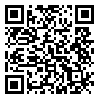Volume 27, Issue 2 (7-2021)
Back to this Issue |
Back to browse issues page
Download citation:
BibTeX | RIS | EndNote | Medlars | ProCite | Reference Manager | RefWorks
Send citation to:



BibTeX | RIS | EndNote | Medlars | ProCite | Reference Manager | RefWorks
Send citation to:
Keshmiri S, Darabi A H, Tahmasebi R, Vahdat K, Noroozi A. Factors influencing COVID-19 vaccine acceptance based on the behavioral change wheel model in Bushehr province in 2021: A web-based study. Journal of Hayat 2021; 27 (2) :190-205
URL: http://hayat.tums.ac.ir/article-1-4138-en.html
URL: http://hayat.tums.ac.ir/article-1-4138-en.html
1- Dept. of Anesthesiology, School of Medicine, Bushehr University of Medical Sciences, Bushehr, Iran
2- The Persian Gulf Tropical Medicine Research Center, The Persian Gulf Biomedical Sciences Research Institute, Bushehr University of Medical Sciences, Bushehr, Iran
3- Dept. of Biostatistics and Epidemiology, School of Health, Bushehr University of Medical Sciences, Bushehr, Iran; The Persian Gulf Tropical Medicine Research Center, The Persian Gulf Biomedical Sciences Research Institute, Bushehr University of Medical Sciences, Bushehr, Iran
4- Dept. of Infectious Diseases, School of Medicine, Bushehr University of Medical Sciences, Bushehr, Iran; The Persian Gulf Tropical Medicine Research Center, The Persian Gulf Biomedical Sciences Research Institute, Bushehr University of Medical Sciences, Bushehr, Iran
5- Dept. of Health Education and Promotion, School of Health, Bushehr University of Medical Sciences, Bushehr, Iran; The Persian Gulf Tropical Medicine Research Center, The Persian Gulf Biomedical Sciences Research Institute, Bushehr University of Medical Sciences, Bushehr, Iran ,azitanoroozi@yahoo.com
2- The Persian Gulf Tropical Medicine Research Center, The Persian Gulf Biomedical Sciences Research Institute, Bushehr University of Medical Sciences, Bushehr, Iran
3- Dept. of Biostatistics and Epidemiology, School of Health, Bushehr University of Medical Sciences, Bushehr, Iran; The Persian Gulf Tropical Medicine Research Center, The Persian Gulf Biomedical Sciences Research Institute, Bushehr University of Medical Sciences, Bushehr, Iran
4- Dept. of Infectious Diseases, School of Medicine, Bushehr University of Medical Sciences, Bushehr, Iran; The Persian Gulf Tropical Medicine Research Center, The Persian Gulf Biomedical Sciences Research Institute, Bushehr University of Medical Sciences, Bushehr, Iran
5- Dept. of Health Education and Promotion, School of Health, Bushehr University of Medical Sciences, Bushehr, Iran; The Persian Gulf Tropical Medicine Research Center, The Persian Gulf Biomedical Sciences Research Institute, Bushehr University of Medical Sciences, Bushehr, Iran ,
Abstract: (4798 Views)
Background & Aim: Considering the importance of COVID-19 vaccine acceptance to end the corona disease pandemic, the study was conducted to determine the factors affecting the vaccine acceptance based on the behavioral change wheel mode and its components (capability, opportunity, and motivation).
Methods & Materials: In this cross-sectional study, 1102 adults aged 18 years and older living in Bushehr province were selected by multi-stage sampling method from February 16 to 28, 2021. To collect the data, a questionnaire including demographic characteristics, questions on the constructs related to the behavioral change wheel model components and questions on the COVID-19 vaccine acceptance was completed on WhatsApp platform. Data was analyzed using the SPSS software version 22.
Results: The results of the study showed that most participants tended to receive the Iranian vaccine (726 people or 65.9%). Among the demographic factors, only gender was associated with vaccination, and men were more likely to accept to be vaccinated (P=0.022). Among the model constructs, the most predictive construct was related to social support in the opportunity component (P<0.001, β=0.55 and B=0.183). In the motivation component, social role (P<0.001 and β=0.118 and B=0.162) and in the capability component, behavioral regulation (P<0.001 and β=0.152 and B=0.155) had the highest predictor of vaccine acceptance. In general, constructs of opportunity component had the greatest impact on vaccine acceptance.
Conclusion: In order to increase the acceptance of COVID-19 vaccination, opportunities should be provided through social support, vaccination should be introduced as a social role, and behavioral regulation, in other words, understanding of the ability to vaccinate to prevent the disease and break the disease transmission chain should be promoted.
Methods & Materials: In this cross-sectional study, 1102 adults aged 18 years and older living in Bushehr province were selected by multi-stage sampling method from February 16 to 28, 2021. To collect the data, a questionnaire including demographic characteristics, questions on the constructs related to the behavioral change wheel model components and questions on the COVID-19 vaccine acceptance was completed on WhatsApp platform. Data was analyzed using the SPSS software version 22.
Results: The results of the study showed that most participants tended to receive the Iranian vaccine (726 people or 65.9%). Among the demographic factors, only gender was associated with vaccination, and men were more likely to accept to be vaccinated (P=0.022). Among the model constructs, the most predictive construct was related to social support in the opportunity component (P<0.001, β=0.55 and B=0.183). In the motivation component, social role (P<0.001 and β=0.118 and B=0.162) and in the capability component, behavioral regulation (P<0.001 and β=0.152 and B=0.155) had the highest predictor of vaccine acceptance. In general, constructs of opportunity component had the greatest impact on vaccine acceptance.
Conclusion: In order to increase the acceptance of COVID-19 vaccination, opportunities should be provided through social support, vaccination should be introduced as a social role, and behavioral regulation, in other words, understanding of the ability to vaccinate to prevent the disease and break the disease transmission chain should be promoted.
Send email to the article author
| Rights and permissions | |
 |
This work is licensed under a Creative Commons Attribution-NonCommercial 4.0 International License. |






